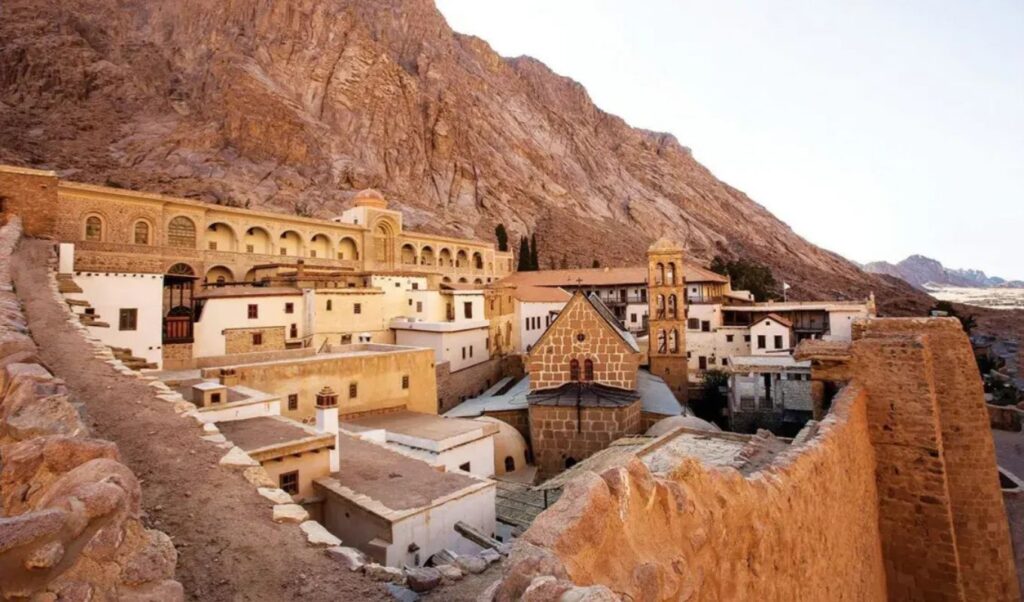The Ministry of Education, Religious Affairs and Sports is proceeding with the establishment of a public law legal entity for Mount Sinai Monastery under the name “Greek Orthodox Holy Royal Autonomous Monastery of the Holy and God-Trodden Mount Sinai in Greece“. The draft law has been put up for public consultation until Tuesday, July 22, 2025 and is available on opengov for comments and suggestions.
Legal status of Mount Sinai Monastery in Greece
The government had announced this move at the beginning of the year, despite the fact that the Ismailia Court of Appeals questioned the ownership status of Mount Sinai Monastery in late May. This development represents a significant step for the Holy Monastery of Saint Catherine of Sinai following diplomatic contacts between Greece and Egypt.
With this law, Mount Sinai Monastery will acquire legal status in Greece, something that as Foreign Minister Georgios Gerapetritis emphasized, had been “up in the air” for years.
Content and purpose of the draft law
The Ministry of Education’s draft law is titled “Establishment of a Public Law Legal Entity under the name ‘Greek Orthodox Holy Royal Autonomous Monastery of the Holy and God-Trodden Mount Sinai in Greece'” and includes regulations for matters of the General Secretariat of Religious Affairs.
According to Article 1, the purpose of the law is the representation in Greece of the autonomous religious legal entity of Mount Sinai Monastery. The same article states that Mount Sinai Monastery was founded around the year 549 on Mount Sinai, where it has operated continuously and uninterruptedly with the same purpose.
Mount Sinai Monastery is mentioned in paragraph 8 of Article 18 of the Constitution as “Holy Monastery of Sinai” and is administered by the holy Sinai brotherhood according to divine and sacred canons.
Organization and function of the legal entity
The draft law refers to supporting the work of Mount Sinai Monastery and managing the property entrusted to the public law legal entity. According to Article 2, the objective is the establishment and organization of the administration and operation of this legal entity.
The legislative regulation for Mount Sinai Monastery includes 20 articles in total. As the Ministry of Education states, this draft law “definitively solves the fundamental problem of the legal personality of the Holy Monastery of Sinai in Greece”.
Diplomatic contacts and international struggle
The Mount Sinai Monastery issue was at the center of Kyriakos Mitsotakis’s phone communication with Egyptian President Abdel Fattah el-Sisi at the beginning of the month. The Greek Prime Minister emphasized that there must be an agreement as soon as possible and pressed for the resolution of the issue.
Greek diplomacy is trying to ensure:
- The Greek Orthodox character of Mount Sinai Monastery
- Its proper functioning for the future
- Its legal status
Meanwhile, the struggle continues at the international level to pressure Egypt. Greek MEPs have submitted relevant questions to the European Parliament and have denounced the actions regarding the violation of the status of the historic Mount Sinai Monastery.
The stance of the Sinai brotherhood
The Sinai brotherhood, headed by the abbot of Mount Sinai Monastery, Archbishop of Sinai Damianos, continues contacts and briefings with institutional bodies. The brotherhood makes it clear that it will not back down on the rights of Mount Sinai Monastery.
The Ministry of Education’s move to submit the draft law to Parliament filled the brotherhood with hope. It expects Egypt to receive the message that Greece is indeed interested in Mount Sinai Monastery and to recognize its legal entity as well.
According to the Ministry of Education, this is a “critical reform for implementing the government’s overall policy for strengthening and supporting Orthodoxy in the East”.




